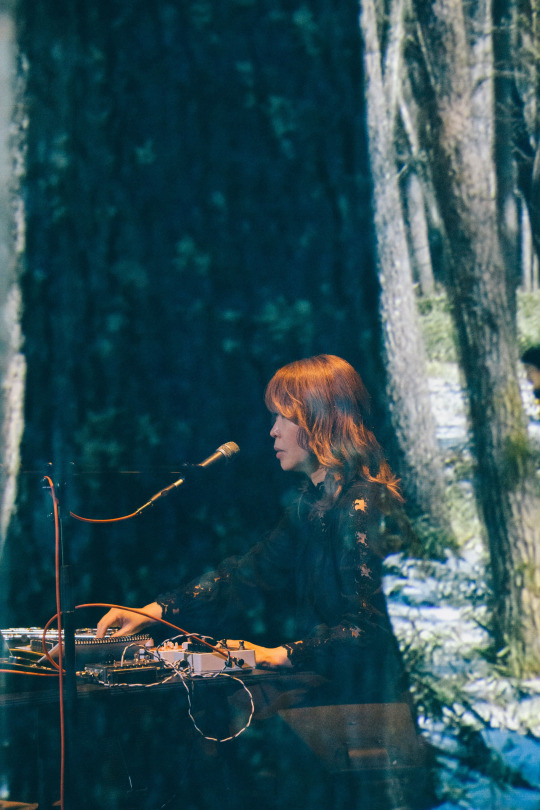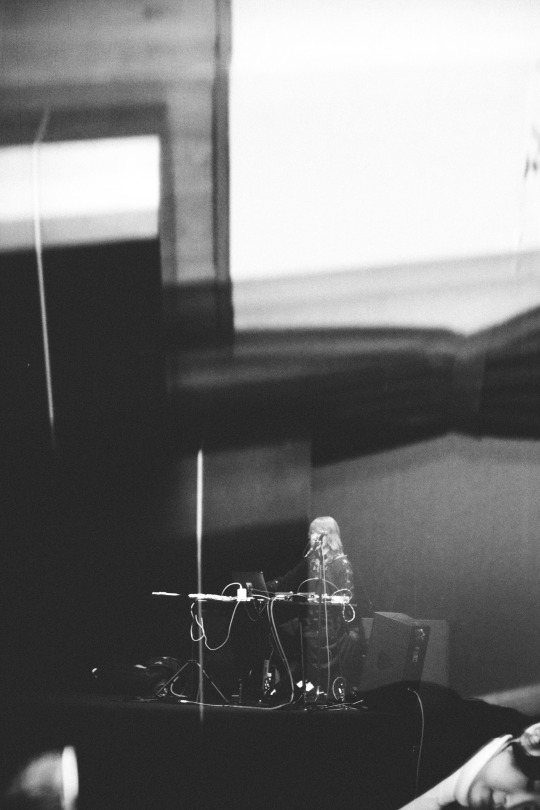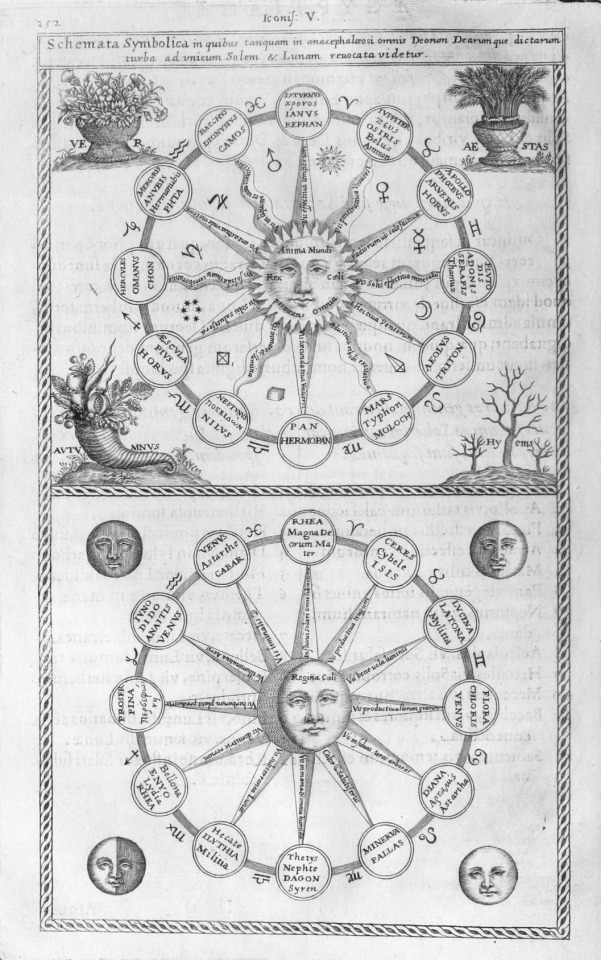#the renaissance society
Explore tagged Tumblr posts
Text

I will now never be able to hear, read, think, or say the Jenny Holzer phrase™, "Protect Me From What I Want" without sticking "Sushi Platter" on the end.
image: Jenny Holzer, Protect Me From What I Want (Sushi Platter), 1997, etched glass, ed. 25, from the Renaissance Society's collection of fundraising tchotchkes artists signed onto and now might be haunted by, selling at Wright 20 in Chicago on 11 July 2024.
#jenny holzer#protect me from what i want#sushi platter#this is far from the most eye-popping thing she's put her truisms on ofc but it still stands out for some reason#the renaissance society
7 notes
·
View notes
Text
Eiko Ishibashi's Mournful Meditations

Eiko Ishibashi; photo by Shuhei Kojima
BY JORDAN MAINZER
When composing for film, singer-songwriter and musician Eiko Ishibashi knows how to both pull you in and shock you out of what you expect. Her latest fruitful collaborations have come with director Ryusuke Hamaguchi, Ishibashi first composing the score for Hamaguchi's 2021 film Drive My Car. Her musical cues tie into the narrative to the point where they're inexorably linked. I saw Drive My Car once when it came out, and every time I listen to its Original Soundtrack, I'm taken back to exactly the points in the film associated with each track.
Ishibashi and Hamaguchi's second collaboration, however, is a bit more complicated in terms of relationship between picture and sound. Hamaguchi was set to follow up Drive My Car with a 30-minute short silent film specifically designed to be screened with Ishibashi's live score. As he shot it, it grew into a full-length feature with dialogue, Evil Does Not Exist, with an accompanying score and soundtrack (out now via Drag City) from Ishibashi. Yet, Hamaguchi didn't totally scrap his original idea. Instead, he made a shortened, silent version of Evil Does Not Exist to go along with a live Ishibashi performance, entitled Gift. While it has a similar, if abridged plot to Evil Does Not Exist, viewing Gift is a different experience because it serves to emphasize the narrative power of Ishibashi's music.

Ishibashi; photo by Shuhei Kojima
When I saw a screening of Gift, accompanied by an Ishibashi performance, back in May at the Reva and David Logan Center for the Arts (presented by The Renaissance Society), I had not yet seen Evil Does Not Exist or heard the standalone soundtrack. I was familiar with the basic plot of both films: A development company wishes to build a glamping site in a rural village, much to the chagrin of its residents. Watching Ishibashi perform, I marveled at her ability to tell a story with a mix of sampled elements and live synths and woodwinds. Both films begin with skittering, jazzy cymbals and guitars (played by Ishibashi's partner Jim O'Rourke) before being cut off by the main swelling, dramatic string theme, sound-tracking a long, continuous skyward shot of forest trees in winter. Live, Ishibashi manipulated the sound of the orchestration, cutting it in and out, disorienting you when you got too used to the hypnosis of the shot. Likewise, in Evil Does Not Exist, the sound of footsteps slowly mixes in with the strings until they suddenly stop; at that point, you realize the camera is from the vantage point of a young girl, Hana (Ryo Nishikawa), walking through the woods, and the film goes on.
In both Gift and Evil Does Not Exist, we see characters on screen deep in their routines. It's almost therapeutic watching widower Takumi (Hitoshi Omika)--Hana's father--repeatedly chop wood, fill jugs with water from the stream, and pause for a cigarette. It's even more jarring, then, when these characters are taken out of their routines or beyond their comfort zones, like when Takumi suddenly stops his work because he realizes he's late to pick up Hana. Occasionally, we hear the sound of a distant gunshot as the villagers hunt for deer. During Gift, the booms were not far off from Ishibashi's bass thuds, but they certainly contrasted the light clicking of her pedals during quieter moments, just as they resemble a far cry from more "natural" sounds in Evil Does Not Exist, like the crunching of leaves and rushing water.
But more than challenging the repetitiveness of manual labor, in both films, the sound of a gunshot grows to symbolize the difference between rural and urban experiences. To pitch the glamping site to the villagers, the development company hires two talent agency representatives, Takahashi (Ryuji Kosaka) and Mayuzumi (Ayaka Shibutani), the latter of whom admits that the ringing blast was the first time she had ever heard a gun before. The two actors are, as we learn, clueless about the villagers' way of life, asking whether wild deer would be a threat to potential glampers (as opposed to the glamping site being an existential threat to the deer themselves). In one of the film's most tense scenes, Takahashi and Mayuzumi are put through the wringer when confronted by villagers' concerns about the effect of the glamping site's waste on the safety of their water supply. In Evil Does Not Exist, this scene is sound-tracked only by the stock music of the presentation before the characters start talking, suddenly cutting off. Gift, meanwhile, uses the scene to showcase the power of Ishibashi's compositions: We can feel the tension of the conversation by just hearing her score accompanied by only occasional words on screen.
As Takahashi and Mayuzumi shadow Takumi and help as much as possible with chopping wood, carrying water canisters, and so on, they become slightly more accustomed to the villagers' way of life and empathetic to their perspectives. They bluntly communicate the villagers' concerns to the project heads, who would rather rush through the project so as to keep their time-limited COVID subsidies. What happens from here, I will not spoil, though it's clear Hamaguchi's asking moral questions about the lengths people go to protect their loved ones and their surroundings, and whether or not the fight against capitalism is all-or-nothing. But during the scenes where the talent agency representatives are helping out, Ishibashi layers syncopated strings on top of the natural sounds, as if to blur the lines between humankind and the natural world, throwing even more wrenches into Hamaguchi's central queries.

Because Hamaguchi and Ishibashi render so complex the relationship between picture and sound via Gift and Evil Does Not Exist, the latter's soundtrack doesn't necessarily provide a new way to experience the projects' themes. Like that of Drive My Car, though, the soundtrack places you back in each scene. What's more, it exudes the films' distinctive moods. Of course, the opening and pseudo title track "Evil Does Not Exist v.2" consists of pattering drums and scraggly guitars giving way to the aforementioned solemn main string theme, squarely placing the film's beginning forest shot in your mind. The spacey synthesizer blips of "Hana V.2" make you picture the consistent wandering of its namesake character, the sound of thumping bass and footsteps making the listener feel an almost parental instinct when thinking about a child alone. And "Smoke" juxtaposes tactile and malleable instrumentation, a collection of cymbals, kick drum, woodwinds, and buzzing drones, the sonic manifestation of Hamaguchi's musings on the extent to which we can bend the world to suit our whims. Are we extensions of our surroundings, or have they become subservient to us? Does evil actually exist? Take in Hamaguchi and Ishibashi's multi-media world, and you'll have no answers, but certainly more to chew on while you, too, go about your every day.
#live music#eiko ishibashi#drag city#reva and david logan center for the arts#the renaissance society#evil does not exist#shuhei kojima#ryusuke hamaguchi#drive my car#gift#jim o'rourke#ryo nishikawa#hitoshi omika#ryuji kosaka#ayaka shibutani
2 notes
·
View notes
Text

they definitely know how joan of arc felt…
info + close ups under cut:


george here is very loosely based on the statue of saint george by donatello located at orsanmichele in florence and charles is not as loosely based on saint sebastian by guido reni
chose these saints purely bc i either fw their stories or fw the art and symbolism around them
#credit to everyone else who has done concepts similar to this before me#society (tumblr) knows a suffering man when they see one#f1#george russell#charles leclerc#my art#turns out studying in a place w strong historical connections to renaissance has made me very Normal about renaissance art#and religious imagery… who would’ve thought#formula 1 fanart#formula one fanart#f1 art
88 notes
·
View notes
Note
do machete and vasco live in a dog only world? or are there other animals? and are there non anthropomorphic animals too, or are they all anthropomorphicized?
I'd say
1. replace all humans with domestic dogs
2. actual four-legged dogs don't exist
3. wild canids, like wolves and foxes, exist but aren't anthropomorphic
4. the rest of the animal kingdom is the same
#I think you'll have to just suspend your disbelief with me on this one#there's some mental gymnastics involved to make this scenario work but don't think about it too hard it's just dog people#answered#anonymous#it's kind of sad that real dogs are absent because their role in renaissance society was pretty significant#hunting in particular was a popular pastime and it often involved lots of hounds and now they have to manage without
426 notes
·
View notes
Text

#old money aesthetic#old money#old vanguard#luxury#rich lux#harlem renaissance#luxury lifestyle#millionaire#rich life#billionaire#luxurious#rich#millionarelifestyle#lifestyle#posh life#high class#highsnobiety#high society#black luxury#luxury black women#black women in luxury
433 notes
·
View notes
Text

1600’s celestial engraving by Athanasius Kircher
#old art#illustration#occult#witchy things#engraving#gothic#alchemy#artwork#esoteric#witchcraft#art#fine line#hedge witch#astrology#zodiac#medieval#renaissance#etching#block print#mystical#hermetic#old book#witchy aesthetic#goth#whimsigoth#secret society#old god#symbolism#magick#pagan
103 notes
·
View notes
Text

#literature#books#dark academia#aesthetic#dead poets society#poetry blog#poets on tumblr#sylvia plath#books and libraries#spilled poetry#writers and poets#bookblr#renaissance#light acamedia#cottage aesthetic#vintage#poem#artists on tumblr#poets corner#writeblr#writing#female writers
49 notes
·
View notes
Text
There’s a quiet choreography to it, the folding, the tucking, the deliberate creasing of yourself into corners. Not all at once, but carefully, slowly, with an artisan’s precision. You fold yourself in halves, then quarters, then into shapes so small they can fit into the margins of someone else’s world. Their part of the picture remains untouched, pristine, brilliant in its wholeness, because of course it does. You see them in sunlit colors, smoothed out of imperfections, a constellation too sacred to rearrange. But your side? Your side crumples inward, unworthy of the same space, as though the part of you that stands beside them demands to be erased. It’s not their doing. They didn’t place their hands on you to press you down. You did it yourself. They shine so effortlessly, you dim yourself, shrinking into quiet, convincing yourself it’s safer this way. Safer to leave them untouched. Safer to pretend they were never meant to hold all of you. You press your edges down flat, whispering to the soft parts of yourself, stay still. It’s not self-destruction, it’s preservation.


#dark academia#poetry#inspiration#quotes#dark academic aesthetic#writing#spilled writing#english literature#poetic#writers#spilled thoughts#spilled poetry#spilled words#spilled ink#sylvia plath#prose poetry#franz kafka#dead poets society#classic literature#literature major#literature#literary quotes#twilight renaissance#the twilight saga#twilight#twilightsaga#light academia#classic academia#women writers#female writers
21 notes
·
View notes
Text


It's love, and love is anguish.
– Henry Miller, from 'A Literate Passion: Letters of Anaïs Nin & Henry Miller 1932-1953'
#book quotes#quoteoftheday#quotes#love poems#longing#lovers#love quotes#love#dead poets society#poetry#poem#poetrycommunity#writing community#writings#lovequotes#english literature#literary quotes#classic literature#literature#pinterest#quotes tumblr#academia aesthetic#art aesthetic#art academia#artwork#renaissance#spilled words#dark academia style#spilled writing#spilled poetry
36 notes
·
View notes
Text









Lover, I am nothing but a petal of darkness which falls on your lap. I am nothing but a rose with too much thorn, I am nothing without your love which hurts me adorned. But let me rejoice in my fateful sleep, where our hearts conjoin and meet — a destined life without this one,
a poisonous love,
my darling one.
#roses#flowers#love poem#fyodor dostoevsky#dead poets society#dark academia aesthetic#dark aesthetic#dark femininity#dark feminine energy#gone girl#vampires#witchy#classic literature#literature#poetry#poets on tumblr#poem#poets corner#writers and poets#poems and poetry#poetic#dark romance#dark romanticism#romanticism#unrequited love#unrequited feelings#renaissance#classical literature
20 notes
·
View notes
Text
i know the condiments aisle just HATESSSSSS to see remus lupin coming
#the elves are running around trying to make sure they have enough spreads#'werewolves are a threat to society' and the only threat remus poses is to a jam jar#which was more revolutionary: the renaissance. or moony toast?#atyd
22 notes
·
View notes
Text

Defending bridge battle with the Landsknecht brois.
16 notes
·
View notes
Text
Aisi sera groigne qui groigne ~ let them grumble; that is how it is going to be. — one of Anne Boleyn's many mottos adopted by her in her lifetime
Introducing courtesan, fencer (and spy) for hire (currently a resident of Francis I’s court ~ French: François I), Maude.
Alias: Bianca Bedi.
Alias translation: "pure priest" or "pure and sanctified" an alias this courtesan and fencer (and spy) picked for the dramatic irony but we need not address that now, my dear reader.




#meeracosplays#society of creative anachronism#oc: Maude#16th century#renaissance#cosplay#oc cosplay#cosplayers of tumblr#my cosplay#my characters#historical reenactment#reenactment#historical fashion#history bounding#bisexual#queer#lgbtq+#genderqueer#nonbinary#anne boleyn
15 notes
·
View notes
Text

Oh hey you can buy "Untltled", 1992, the Felix Gonzalez-Torres tattoo, at the Renaissance Society. This was not always the case.
image:screenshot from store.renaissancesociety.org
14 notes
·
View notes
Text
In the Shadow of History: Jews and Conversos at the Dawn of Modernity
🇪🇸 José Faur argumenta que los conversos (judíos forzados a convertirse al cristianismo) fueron un factor clave en el colapso de la sociedad eclesiástica durante la Edad Media y en el ascenso del secularismo y la modernidad. A través de un análisis detallado, Faur explora cómo la conversión forzada de los judíos en la península Ibérica afectó tanto a la comunidad judía como al mundo cristiano, destacando la influencia de la tradición maimonídica y su impacto en el pensamiento secular. El libro también examina el movimiento anti-maimonídeo, la persecución de minorías y el auge del antisemitismo, que llevaron al declive de las instituciones judías y a la creciente alienación de los conversos. Además, se analiza cómo los conversos contribuyeron significativamente al desarrollo del pensamiento europeo y la literatura, a pesar de enfrentar oposición interna y externa. Finalmente, se discuten las alternativas al secularismo como el pluralismo religioso y cultural, y se reflexiona sobre la posición del "otro" en la tradición occidental, destacando figuras como Bartolomé de Las Casas y Antonio de Guevara que, siendo conversos, defendieron a los nativos americanos frente a las atrocidades españolas. Este enfoque revela las dinámicas de poder y prejuicios que han moldeado las relaciones entre judíos, cristianos y otros grupos a lo largo de la historia.
🇺🇸 José Faur argues that the conversos (Jews forced to convert to Christianity) were a key factor in the collapse of ecclesiastical society during the Middle Ages and the rise of secularism and modernity. Through detailed analysis, Faur explores how the forced conversion of Jews in the Iberian Peninsula impacted both the Jewish community and the Christian world, highlighting the influence of the Maimonidean tradition and its effect on secular thought. The book also examines the anti-Maimonidean movement, the persecution of minorities, and the rise of anti-Semitism, which led to the decline of Jewish institutions and the growing alienation of conversos. Additionally, it analyzes how conversos significantly contributed to the development of European thought and literature, despite facing internal and external opposition. Finally, Faur discusses alternatives to secularism such as religious and cultural pluralism and reflects on the position of the "other" in Western tradition, highlighting figures like Bartolomé de Las Casas and Antonio de Guevara who, being conversos, defended Native Americans against Spanish atrocities. This approach reveals the power dynamics and prejudices that have shaped the relationships between Jews, Christians, and other groups throughout history.
#Conversos#Maimonidean#Persecution#Secularism#Pluralism#Iberia#Christianity#Judaism#History#Society#Assimilation#Anti-Semitism#Blood#Legacy#Religion#Philosophy#Enlightenment#Renaissance#Tolerance#Spain#judaísmo#jewish#judío#cultura judía#jumblr#judíos#Introducción#EdadMedia#Secularismo#Modernidad
4 notes
·
View notes
Text

Remember that Greek and Roman art continues to be both figuratively and literally whitewashed.
🏺🎨🏛️
#history#ancient greece#sculptures#ancient rome#italian renaissance#art history#colorful#western society#ancient greek art#colorless#roman history#color#ancient art#1400s#racism#roman empire#ancient greek history#statues#ancient roman art#western art#classical age#western world#renaissance art#ancient#real art#nickys facts
5 notes
·
View notes